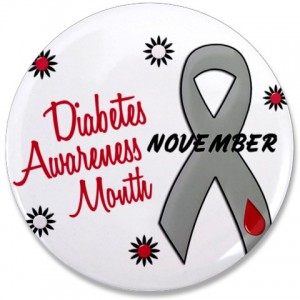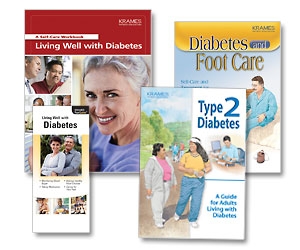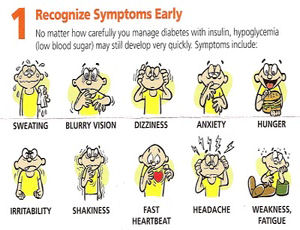Five Years of Living with Diabetes
 | | The font says good times, but the drop of blood reminds you that death is coming with a giant lancet |
Near the end of August, 2006, I cooked what would be the last homemade fetuccini alfredo I'd ever make. It was rich, creamy, heavy, delicious, and decadent, and it filled me with a warmth and happiness that only comes from such a perfectly unhealthy dish. Unfortunately, that warmth and happiness was replaced by a painful stomach ache that didn't go away. I eventually went to my doctor, who took my blood and told me it was probably nothing. The next day, my doctor called me with dread in her voice to tell me that we needed to talk. My blood glucose level was over 360, which I was told could only mean one thing: I was a diabetic at the age of 27.
November is American Diabetes Month, among much else (including National Novel Writing Month and National Pomegranate Month, according to Wikipedia). Astute readers of this blog are no doubt aware of this writer's typical distain for monthly observances, but at the risk of being seen as a hypocrite, I think American Diabetes Month is as good a reason as any to share my experiences as a diabetic with you. It should go without saying that diabetes is one of the greatest health threats in this country today and is likely to continue being a problem as my generation gets older. Though the actual mechanism is ambiguous, the risk of diabetes* is intimately associated with obesity, and as we all know, obesity is a modern American epidemic.
*Type 2. Thoughout this article, when I refer to diabetes, I am refering to type 2, the adult-onset variety that results from insulin resistence.
Indeed, in 2006, I was anything but thin. Growing up the youngest of three hungry boys, I was raised on a diet of take-out, pizza, pasta, and fast food. My mother used to cook for us, but by the time I was a teenager, the poor woman was exhausted and didn't have the energy to force me to eat right. When I got my first car at 16, one of the things I loved about it was that I could keep a giant bag of Skittles in the center console. I wasn't into sports or exercise, so it was no surprise that, by the time I graduated high school, the only shape I was in was round.
 | | This is not health food, apparently |
Things didn't improve in college, where my idea of cooking was to boil some pasta and cover it in Teriyaki sauce, poach chicken in ranch dressing, or simply heat up a can of Chef Boyardee. I really wasn't equipped to take care of myself, but I don't put the blame on my parents for this (though I easily could); I was pretty stubborn when it came to food. There was a year there when I worked at a pizza place and got an infinite supply of free pizza, which subsequently made up nearly 100% of my diet.
Fat was not something I enjoyed being, but I rationalized my poor health as a defining characteristic of being me; if I were to suddenly start eating broccoli, quit smoking, and stop shoving carbs down my throat, I would cease to exist as myself. As a result of this rationalization, I took personal rejection from girls very badly, because I knew, at least unconsciously, that my health had a lot to do with my difficulties with the opposite sex (not to mention my lack of confidence, which kind of went hand-in-hand). I tried to face this after college, but I wasn't able to resist the siren call of fast food and cigarettes. I started to realize that I was on a path of gluttonous self-destruction, so my extreme resistence to change only served to make the first few years of this century the most depressing of my life.
I cannot adequately explain the miracle that pulled me from this funk. 2005 saw me moving in with and marrying my college crush. Separated from my family and friends by hundreds of miles, I was able to start over and make a proper attempt to improve myself. This time six years ago, I successfully quit smoking and haven't been a smoker since. It's a damn good thing I was already trying to be healthier when the diabetes reared its ugly head.
 | | No matter what this guy says, the answer to fast food is not other fast food |
I'd be remiss, though, if I didn't mention my suspicion that I was already showing symptoms when I moved up to Maryland. Some time in 2004, two years before the diagnosis came along, I started to notice that I was constantly thirsty, and as a result, I was urinating a lot. I knew this was a symptom of diabetes, and it's not like I wasn't on the look-out for it. I have diabetes on all sides of my family, and my grandfather--who we think was symptomatic for twenty years before being diagnosed--once gave me a particularly ominous warning to be watchful for the disease, as it can be "a real bastard." Still, there's nothing quite as convincing as denial, so I managed to make myself believe that I had a urinary tract infection, which though embarrassing, wasn't as bad as diabetes.
I bring this up because, if there's one lesson I want people to take away from my story, it is this: if you have even the slightest suspicion that you may be diabetic, it doesn't hurt to have your blood checked. Okay, it hurts a tiny little bit, but a pin prick is nothing compared to having your foot amputated (not that I know what that's like, thank God). Diabetes can be scary as Hell for people, especially people who, like my younger self, have built walls around their ego to defend against self-judgment. Obesity doesn't make you any less human, but nobody should take pride in it. Similarly, having diabetes doesn't redefine who you are; it simply forces you to make some changes.
When I was finally diagnosed, I was terrified. There was a lengthy period of clarity when it was obvious to me that I was paying the price for my poor lifestyle in years of my life. It is a statistical certainty that, as a diabetic, I'm not going to live as long as those without the disease, especially considering how young I was when I developed the condition. This is one of those things you learn in that intense period of education that follows a diagnosis of diabetes. There are scores of people who are trained in educating newly diagnosed patients, and I am eternally grateful for my mother's help in this regard; not only is she a nurse practitioner and my mother, but she is also a fellow diabetic. She flew up from Orlando once I told her what was happening, and she made it her mission for me to understand, without sugar-coating it, what I was facing. She scared me, deliberately, and I am thankful for it.
 | | Within days of being diagnosed, you will be given more brochures than you could possibly imagine |
There was a bright side, however. My youth and my understanding wife made it a little easier to make the necessary life changes, and I would later learn that having a blood sugar of 360, though over three and half times normal levels and definitely a bad thing, is actually pretty damn good for somebody in the throes of an uncontrolled diabetic binge, where numbers can jump into quadruple digits. At the time, though, it felt like a death sentence. Remember, I had convinced myself that change would make me somebody other than myself--that it would betray the existential meaning of who I am--and here I was, being diagnosed with a disease that gave me a choice: make radical changes or die. Diabetes really is that simple.
Granted, they've got great drugs these days that can help. I know many diabetics who still frequently splurge on milkshakes or cupcakes or other things they know are absolutely terrible for them, and they can get away with it--for the most part--because of powerful glucophages and sulfonylureas. However, these drugs only work for so long and so well before they have to be switched out for something new, and as you go down the list, the side effects become less and less pleasant. Though I have spent many years dependant on Metformin--the most popular diabetes drug out there today--I told myself that I wasn't going to rely exclusively on drugs to make my life manageable. I made changes. I was going to be healthy, not just for me, but for my wife, my family, and any children that I would have down the line.
I lost a great deal of weight in the first few months of being a confirmed diabetic. I attribute most of that to quitting soda, because holy crap, I drank a lot of soda. I don't think I fully appreciated how much sugar contributes to weight gain. My brain thought that saturated fat and complex carbohydrates have more to do with your weight, but really, the raw caloric power of sugar--regardless of whether it's natural or refined--is unmatched when it comes to packing on the pounds. Cutting out sugar was supposed to just be the first step, but it solved the vast majority of the problem. If I had known how heavily sugar weighed on my health, I probably would have made more of an effort to whittle it down in my diet years earlier instead of latching on to Subway turkey subs and detox diets (pointer: they don't really work).
 | | You will also become increasingly cartoonish-looking until you get some orange juice |
At the same time, I was working a job that required some manual labor--lifting furniture and such--and I used that to increase the amount of exercise I was getting. There were some rocky times, to be sure, because one of the Catch-22 situations you find yourself in is that you need more exercise and less sugar to get healthy, but when you're glycemic levels are uncontrolled, a combination of low blood sugar and exercise can put you in a friggin coma. The scariest moment of my life was waking up on the floor with my coworkers shoving chocolate in my mouth because I had fallen unconscious in a hypoglycemic fit. (By the way, if there are any of those old coworkers of mine reading this, thank you for helping me out during that difficult transition in my life; you guys rock.)
Low blood sugar is not fun. The symptoms are never quite the same from one episode to the next, but there are some common themes. Your hands will shake, your mind will get muddy and slow, you'll get tired and irritable, you won't be able to see clearly, your teeth will clench uncontrollably, and you could pass out before you even know what's happening to you. It isn't easy to explain to somebody who hasn't experienced it, but it's not something you want to live with. Even now, with my diabetes almost completely under control, I still fear the sudden hypoglycemic fit that can strike unexpectedly at the drop of a hat. I recently experienced my first earthquake, for example, and when it was happening, I thought it was my blood sugar or a stroke before I even considered the possibility that the room really was shaking.
All this talk of the short-term complications shouldn't distract you from the fact that the long-term ramifications are also scary. I mentioned the foot chopping and the lowered life expectency, but diabetes also comes with a whole host of new ways your old age can suck. I have to get my eyes checked every year, because sugar crystals in your capillaries can cause permanent damage to your vision. Though I no longer take any drugs for the diabetes itself, I still have to take drugs for my blood pressure, which remains high simply because I am a diabetic. I also have to have my cholesterol checked every six months, along with my long-term blood sugar levels and much else. I've had sonograms on my pancreas, because apparently that's one of the first things to fail when you're a diabetic. All these tests and concerns--there are too many to name them all--make that finger-pricking blood sugar monitor every diabetic carries around with them seem like no big deal.
But I don't want to scare you too much, because truth be told, being diagnosed with diabetes is one of the best things that ever happened to me. In five short years, I have become far healthier than I've ever been. I eat better, I live better, I weigh a heck of a lot less, and I am more content with my body than I can ever remember being. In short, I am living well. I wasn't wrong to believe that change would alter who I am, but I was wrong to believe that such a change should be avoided. I am not the same person I was before--anybody who's survived the transition to adulthood can say the same thing--and that is a blessing. When I think back on who I was and compare it to who I am, I am happy, and if it took diabetes to get me here, then I will not begrudge it for trying to kill me. Hopefully, I'll still feel the same way at 70, when they're talking about how many of my toes are expendable.
-e. magill 11/08/2011
|
|